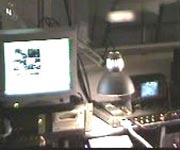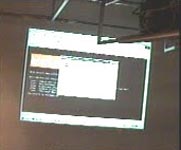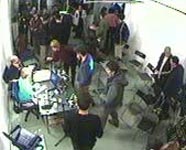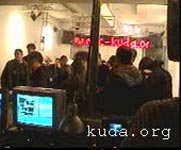kuda.org
interview with
Kristian Lukic (Yugoslavia)
|
|
|||||||||||||||||||||
|
kuda.org |
|||||||||||||||||||||
>>
When was kuda.org born, and from what context - specifically from what political
and cultural context in Yugoslavia? And why now?
Kuda.org is a non-profit organization of artists, theorists, media activists and information users. The idea to establish such an organization derived primarily from the urgent need during the nineties. With the development of ICT, especially in the second half of 1990s, the gap between artistic practice and digital environment grew larger and larger. It was necessary to find a means to span these two separate fields and bring the methods of working in each closer to each other. In 1998, a group of artists (mostly coming from the group Apsolutno) came to the idea of establishing a center that would function as a distributive information point for new media and digital culture in Yugoslavia.
 |
At that time the negative political impact was very strong. Under the Slobodan Milosevic regime, any initiative that was connected with a critical position towards the government was, if not openly prosecuted, than just ignored, which meant lack of any financial (crucial) support. There were many difficulties in founding and especially in sustaining any kind of non-governmental organization. And it is important to say that kuda.org was not a Soros spin off project (although we cooperate with them), so that is why we didn’t have any institution behind us. The idea was born as a virtuality - a possibility - but devirtualizing it in a real space that became kuda.org was a slow process. The lack of financial and governmental support greatly slowed down the speed of realizing the project . |
|
| After the political changes at the end of 2000 - when the regime of Slobodan Milosevic was replaced with DOS (Democratic Opposition of Serbia) - the municipality of Novi Sad gave us a proper space for kuda.org, which finally allowed us to begin our activities. | ||
>> Since you have just opened, it's not possible to ask in detail about your previous activities. But what kinds of events and activities do you have planned for the future? Will kuda.org function as a kind of media lab where people have access to equipment which they can use for production? Or more of a media center, a place for people to meet and discuss issues related to media culture?
Most of the people working at kuda.org are coming from an art background, but our goal is to involve lots of people from different fields and to make possible the emergence of common interdisciplinary interests and activities. In terms of strategic goals, our priority is first to establish media literacy among a larger public. Kuda.org will develop its media lab department (media territory) parallel to its program activities, lectures and presentations (media lounge). What is most significant for us is to raise people's individual consciousness about the importance of content; to form a community of people who, with an increased social, cultural, and aesthetic awareness of media culture, will have the necessary structure for future production. The production cannot come first.
 |
Media literacy also includes communication and the transit and exchange of people and ideas - that means an exchange from kuda to the outside and from the outside to kuda. Kuda.org will provide open space for people from Europe and beyond (in terms of residency programs, presentations, lectures and conferences) to work and to present their projects here. In that sense, one of our intentions is also to gain international visibility and to establish collaboration with similar media centers in the world. At the beginning the most important thing we can do is to begin to make partnerships with organizations in our own "neighborhood," like [mama] from Zagreb, Ljudmila from Ljubljana or InterSpace from Sofia. And this process has already started to happen. |
|
>> There have been other initiatives that seem similar in objectives, at least from an external viewpoint - for instance CyberRex, which is known abroad mainly because its connection to B92, which received a lot of international support and fame after they were shut down by the Milosevic government. How do you define yourself vis a vis CyberRex? Are you collaborating with them or completely unconnected?
Cyberrex is a very important cultural initiative and we (as individual artists) have collaborated with them on different levels. Now, we (kuda.org as an ‘institution’) have the opportunity for cooperation on an institutional or inter-institutional level. As an organization, Cyberrex originated from Rex - the cultural department of Radio B92 - and it was a kind of electronic shelter after the ban by the Serbian authorities against B92 (as a place that disseminated "independent" news that was not biased by the official state propaganda), a ban that occurred soon after the beginning of the bombardment by the US. As the cultural department of B92, Cyberrex was not primarily focused on news or media as such, but more oriented towards cultural activities in wider sense: theater, music, visual arts, film, etc.
 |
Kuda.org is less oriented around art, and more towards new media and ICT technologies and their social and cultural impact. There is a strong need for coding the current digital society (if we dare to say that such a thing exists) in Yugoslavia. The fact that members of today’s Serbian government declare themselves ‘technocrats’ (by the way, the Serbian prime minister just signed a contract with Microsoft, giving Microsoft a strategic position within Serbian infostructure) shows the possibilities for the development of Information Technologies in Serbia. >> What do you mean by "infostructure"? |
|
The term infostructure was used as the title of part of the world-information.org exhibition last year in Brussels and Vienna. The organizers of the event, Public Netbase, used the term to indicate a world that is structured through information (routers, servers, operating systems…hardware, software and wetware).
>> And what does the fact that the Serbian government considers itself a government of "technocrats" actually mean for the possibilities of IT? I'm not sure whether you are using the term in an ironic sense?
I used the term "technocrats" in a partly ironic way, but I actually meant to show the real emphasis of the new Serbian government on Information Technologies. Although their position is quite intricate and not unambiguous, the new "neoliberalist" governmental structure is a reality. So in that sense, on the governmental level, we can say that we are bravely stepping into the New Economy paradigm. But, if we look deeper into this situation, we will see the reasons for our entry into the New Economy as well as its specific limitations.
In an economically exhausted country, after a decade of war, instability and the lack of opportunities for employment, many young people spent their time getting an education (especially in IT), in the hope that one day they will leave the country carrying their knowledge with them as goods that can be exchanged. There are lots of young people who are educated in the field of IT (either on a basic or advanced level). But instead of leaving the country, many programmers and computer experts are offered the opportunity to stay, working in ‘remote slavery’ for multinational IT corporations for 4-5000 $ per year without any kind of insurance (social, health…), which is approximately ten times lower than in developed countries. From the governmental point of view this is ok, because there is Real Cash coming from the outside, and educated people are staying in the country.
 |
These are some of the reasons why raising a critical awareness towards the (mis)use of technology is most important in countries where the implementation of digital culture is still in its beginnings. Digital culture can offer opportunities, and simultaneously new forms of slavery. The inevitable delay in the implementation of digitalization and the permanent material dissatisfaction among those who are in a position to profit from them creates an atmosphere of latent frustration. This frustration is often expressed as a non-critical approach to technology - that is, when technology finally finds its way to the local market. |
|
With a rising awareness of media culture during the eighties and especially the nineties, Yugoslavia participated on some level in the ‘revolutionary’ paradigm of media technology. The experience of ‘media hype’ during the late eighties, when ethnic particularisms gained their 15 minutes of media glory, was ‘stimulating’ for individuals' media consciousness. The culmination of the media revolution in Yugoslavia reached its highest level during the bombardment of 1999 when most people watched their own war on TV screens - first you feel the earthquake, then you go to see on TV what’s happened. A further step was not only watching the war on the television screen, but also intervening in it. Soon after the beginning of the war, we could buy the ultimate game on the software black market: The Art of War II: Flashpoint Kosovo. The digital era was won.
>> Since you're being ironic about two ways to "win" the digital era - by the government, which can create a new form of slavery in its own interests, and through commercialization (which can offer a false sense of freedom by reducing intervention to the level of a virtual game) how do you propose an alternative to this through the activities of kuda? Can you say specifically what is the importance of an "independent" initiative in the promotion of digital culture? And how do you define this independence?
 |
There is no total independence. When you are starting from this kind of presupposition, you are prepared for struggle. From our point of view at kuda, the most important thing is to educate people, especially young people, so they can develop a critical awareness and make their own decisions. If we get support from the government or other institutions to achieve these goals, we’ll accept it, as long as the institution that offers support has a position that is similar to ours, and so long as it does not impose conditions which would require us to compromise our own position. For instance, kuda.org is preparing several workshops with an aim to educate school teachers. We don’t want to become a closed circle of enthusiasts with no external effect, and that is why we want to be near to social structures like schools, universities, and even governmental institutions. |
|
| The experience of the late eighties and beginnings of nineties, when lots of people wanted to be independent from authoritarian pressure, has taught us the weakness of that approach. That independence actually helped in increasing the power of the regime. If you are independent from something, you are automatically an object from the perspective of the structure you want to be independent from. Today, we must be more active and we must become subjects. We must force the elements of political public structures to become dependent on individuals - from the inside rather than from an external, antagonistic position. | ||